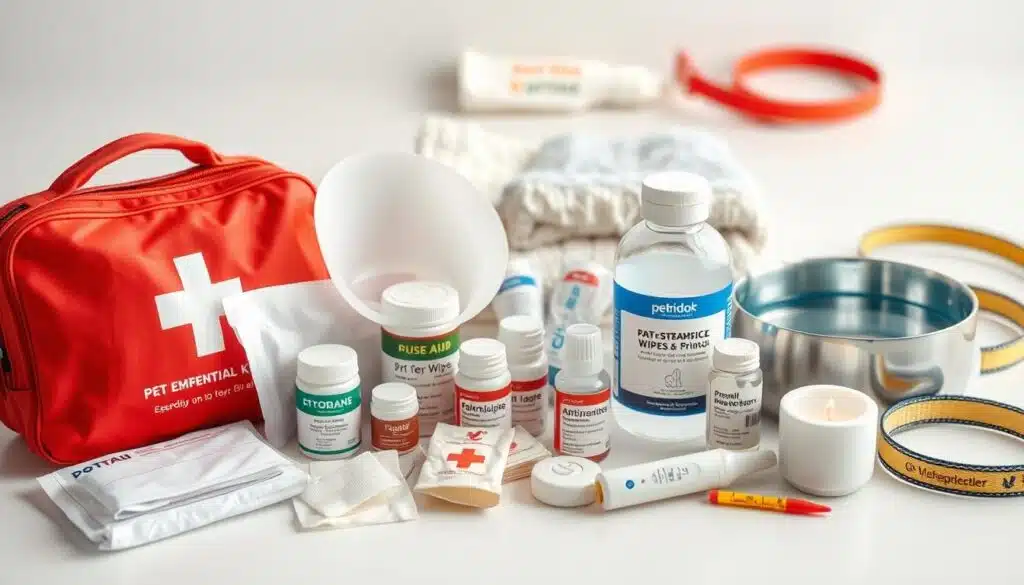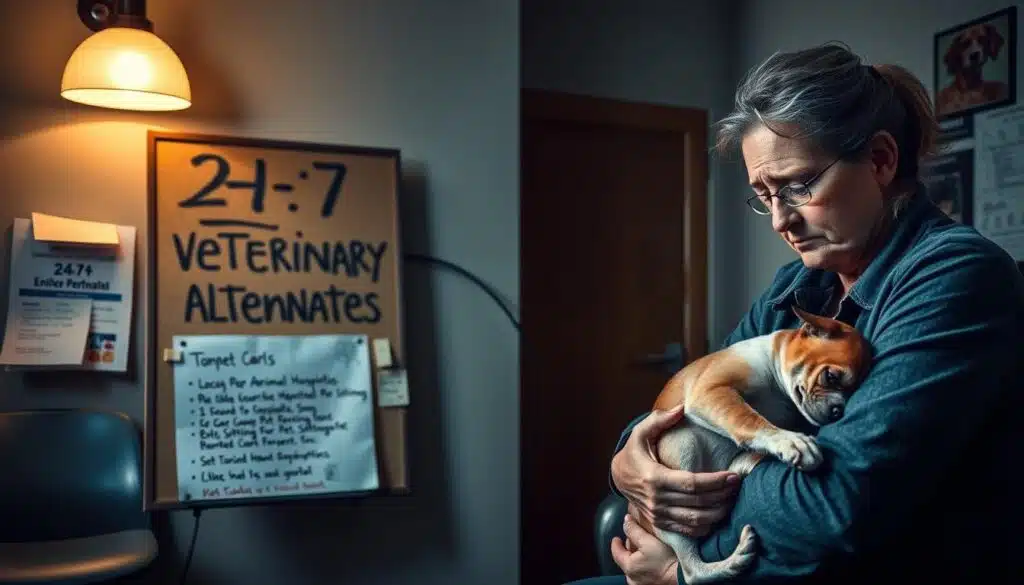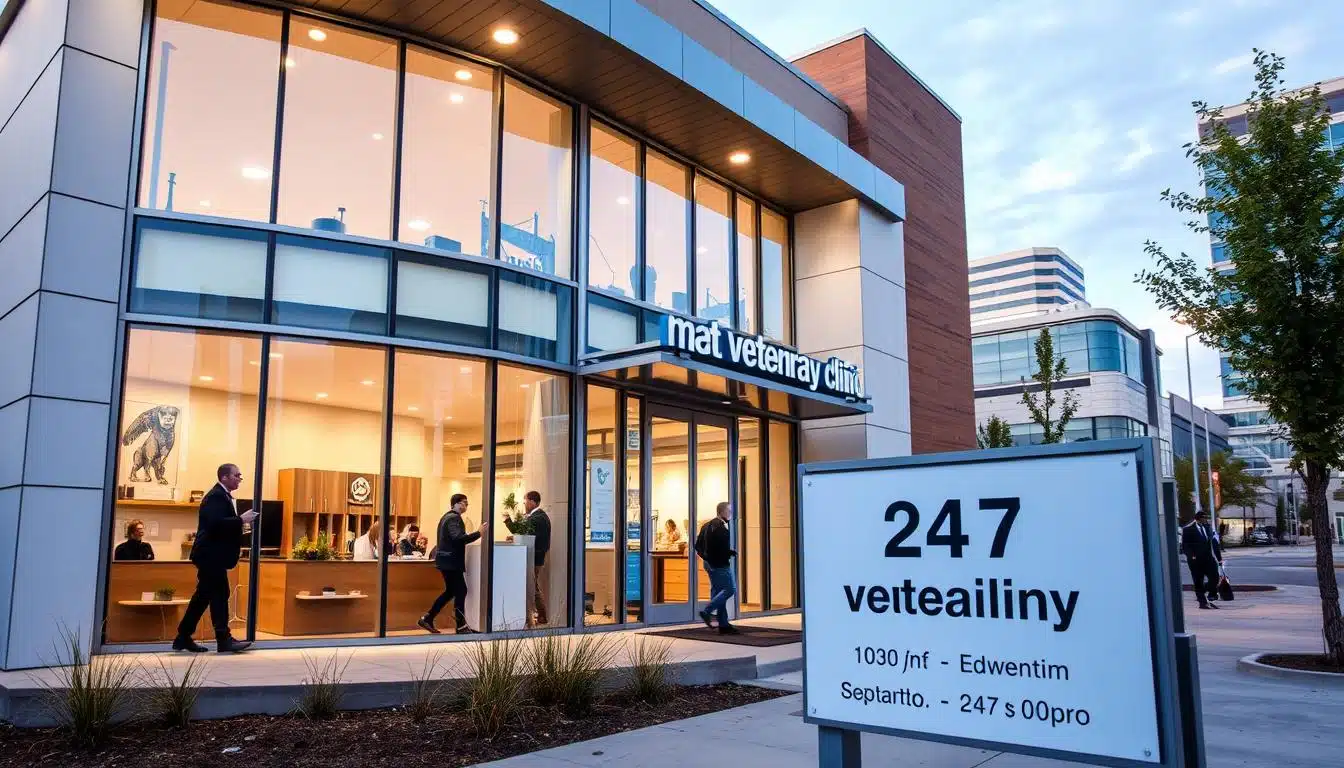Imagine it’s midnight and your pet is struggling to breathe. Every second is critical, but finding help can be hard. In Edmonton, where nights are long and emergencies happen anytime, knowing where to find 24/7 veterinary clinics in Edmonton is key. They offer emergency vet services in Edmonton for any urgent situation.
This guide helps you find help when your pet needs it most. Whether it’s a weekend poisoning, a sudden injury, or a midnight crisis, emergency vet services in Edmonton are ready to help. You’re never alone when your pet needs urgent care.
Your pet’s health doesn’t stop when clinics close. 24-hour animal hospitals in Edmonton offer after-hours care for emergencies like seizures, poisonings, or trauma. But how do you pick the right service? This article guides you from recognizing urgent signs to understanding costs at Edmonton pet emergency services.
Key Takeaways
- Prepare now: Know 24/7 veterinary clinics in Edmonton locations before an emergency strikes.
- Learn urgent pet care signs to act fast, not frantic.
- Costs vary, but after-hours vet care options include payment plans and insurance tips.
- Emergency facilities prioritize stabilization first, then diagnosis.
- Proactive steps reduce risks—like pet-proofing homes for seasonal hazards.
Understanding Pet Emergencies: When to Seek Immediate Veterinary Care
Knowing when to act fast can save your pet’s life. Emergency pet care needs quick decisions. Animal emergency clinics in Edmonton are ready to help, but how do you know when to go? This guide will help you spot critical signs and situations.
Common Signs Your Pet Needs Emergency Care
Watch for these red flags needing urgent pet treatment:
- Sudden inability to walk or stand
- Severe vomiting or diarrhea lasting over 24 hours
- Uncontrolled bleeding from wounds
- Extreme lethargy or unresponsiveness
Life-Threatening Symptoms Requiring Immediate Attention
These situations demand immediate travel to a pet emergency clinic:
- Poisoning (chocolate, antifreeze, or medications)
- Seizures lasting longer than 2-3 minutes
- Choking or blocked airways
- Major trauma from car accidents or falls
Non-Emergency Situations That Can Wait
These issues can often wait for regular vet hours:
- Mild limping without visible injury
- Minor ear infections
- Slight appetite loss under 24 hours
- Localized swelling without systemic symptoms
Always err on the side of caution. When in doubt, contact urgent animal care Edmonton providers for guidance. Trust your instincts—your pet’s health depends on quick, informed decisions.
Complete List of 24/7 Veterinary Clinics in Edmonton
When every minute counts, knowing where to go is key. Here’s a guide to Edmonton’s 24-hour animal clinics. They are organized by area for easy access. All clinics offer urgent care, diagnostics, and specialized treatments for pets in crisis.
North Edmonton Emergency Veterinary Options
- Northern Lights Animal Emergency Clinic
456 Castle Downs Blvd NW
Phone: 780-555-1234
Offers emergency surgery and overnight care for cats and dogs. Visit northernlightsanimal.ca. - Northside Veterinary Urgent Care
123 Northgate Rd
Provides 24/7 access to a veterinary clinic open 24 hours. Specialists handle trauma, poisoning, and cardiac emergencies.
South Edmonton After-Hours Pet Care Facilities
Residents in Millwoods and Ellerslie can rely on these trusted options:
- Millstream Animal Hospital
321 South St SE
Edmonton’s premier emergency vet clinic Edmonton for pets requiring overnight stays. Services include x-ray and bloodwork. - Southside 24-Hour Pet Hospital
789 Ellerslie Rd
Open daily, providing round-the-clock care for poisoning cases and respiratory distress. Call 780-555-5678.
West and Central Edmonton Round-the-Clock Animal Hospitals
West and downtown areas have these vital resources:
- West Edmonton Veterinary Emergency Centre
1010 104 St SW
A full-service animal hospital Edmonton with ICU units and orthopedic specialists. Check westedmontvet.ca for directions details. - Central Pet Urgent Care
45 Downtown Ave
The only 24-hour pet hospital in the city core. Handles emergencies like seizures and heatstroke. Open 24/7, including holidays.
What to Expect During an Emergency Vet Visit
Going to an emergency pet clinic in Edmonton can be scary. But knowing what to expect can make it less stressful. When you arrive, the staff will quickly sort out who needs help the most. This means pets in real danger get help right away, no matter when they arrive.
- Bring key details: vaccination records, current medications, and a timeline of symptoms.
- A veterinarian will assess your pet’s condition and explain next steps for urgent veterinary services.
- Diagnostic tests like X-rays or bloodwork may be needed to determine care plans.
At the emergency vet visit, you’ll be asked about your pet’s history. Make sure you have your regular vet’s contact info for follow-up. You’ll also talk about treatment costs and fill out billing paperwork.
Waiting times can vary at emergency animal hospitals. But the staff will keep you informed about your pet’s progress. Before you leave, you’ll get instructions on how to care for your pet at home. Remember, veterinary emergency services in Edmonton focus on quick care and clear communication about your pet’s treatment.
The Cost of Emergency Veterinary Care in Edmonton
Emergency situations need quick action. Knowing the costs helps you prepare. Here are important details on expenses, payment options, and support for unexpected vet needs.

Average Pricing for Common Emergency Procedures
Emergency vet costs vary based on the treatment. Common procedures in Edmonton include:
- X-rays: $200–$500
- Overnight monitoring: $150–$300/night
- Emergency surgery consultations: $300–$800 initial fee
Payment Options and Pet Insurance Considerations
Many clinics offer payment plans for vet services. Pet insurance, like Trupanion or Petplan, can help with emergency care. Check policies to keep costs in check.
Financial Assistance Resources for Pet Care
If costs are tough, look into financial help for pet care. Organizations like Alberta Animal Rescue Crew Society (AARCS) offer grants. Some clinics have sliding-scale fees for affordable care, ensuring pets get help without financial burden.
How to Transport an Injured or Sick Pet Safely
It’s very important to handle pets safely during emergencies. This helps prevent more harm. Here are some steps to follow when moving injured pets or those in pain without adding stress.
- Use a rigid surface like a wooden board or a rolled-up blanket as a makeshift improvised pet stretcher.
- Secure the animal gently with towels or straps to stabilize limbs without applying pressure to injuries.
- Always keep the stretcher level to avoid jostling during pet emergency transport.
Safe Containment Methods for Small Pets
For cats, rabbits, or rodents, use a ventilated carrier lined with soft bedding. Wrap small pets in a towel first to minimize movement. Make sure the carrier is secured upright in the car to keep sick animals safe. Don’t overcrowd the vehicle.
Techniques for Handling Pets in Pain
Muzzling may be necessary for dogs showing aggression due to pain. Use a calm voice and gentle restraints. For all species, try to minimize noise and motion. Emergency animal transport techniques need patience—never force movements that distress the animal.
Preparing an Emergency Kit for Your Pet
Every pet owner in Edmonton should make a pet emergency kit for sudden crises. Having the right emergency preparedness for pet owners means being ready for frostbite, heatstroke, or injuries. This kit helps you face Edmonton pet emergencies anytime.
- Include pet first aid supplies like gauze, non-stick bandages, and a digital thermometer.
- Store medications, medical records (in waterproof containers), and emergency contact info for vets.
- Add Edmonton-specific items: paw balm for winter, cooling towels for summer, and thermal blankets. These emergency supplies for pets address seasonal risks unique to Alberta’s climate.

Check emergency pet care supplies often for expired items. Replace them and keep the kit in a spot you can easily reach. Pet first aid kit essentials should be quick to grab in emergencies.
This kit is not a full substitute for professional care. It helps buy time until you can get to a 24/7 clinic. Keep your pet emergency kit up to date all year.
Differences Between Regular and Emergency Veterinary Services
Deciding between regular vet visits and emergency care depends on your pet’s needs. Knowing the difference between regular vs. emergency vet care helps you act fast in emergencies. It also helps manage your pet’s routine health needs well. Here’s how these options differ:
Staffing and Specialization at 24-Hour Animal Clinics
24-hour animal clinics have vets trained in critical care and technicians skilled in emergencies. They have life-support equipment and staff available 24/7. This means they can handle severe injuries or poisoning cases that regular clinics can’t handle during normal hours.
How veterinary triage processes work
- Emergency animal hospitals prioritize patients based on life-threatening symptoms first.
- Cases like breathing difficulties or severe trauma are treated immediately, while less urgent issues wait.
- Wait times may vary due to veterinary triage processes focusing on saving lives before non-immediate concerns.
Coordinating follow-up veterinary care
After an emergency visit to a 24/7 veterinary care for pets facility, your regular vet gets detailed records. This ensures a smooth transition. For example, if your pet is stabilized at an emergency animal hospital, their team will outline next steps for your primary vet. Clear communication helps bridge the gap between urgent and routine checkups.
Alternatives When You Can’t Reach a 24/7 Veterinary Clinic in Edmonton
When storms or road closures stop you from getting to clinics, look into . You can use veterinary telemedicine or mobile vet services Edmonton for help. These services give advice but can’t replace in-person care for serious issues.

“Telehealth consultations can stabilize conditions but never delay life-threatening emergencies,” states the Alberta Veterinary Medical Association.
- Telemedicine platforms let you talk to vets online. They check your pet’s symptoms and tell you what to do next for minor problems.
- Pet emergency helplines like the Canadian Poison Control’s 24/7 line help with poisonings or trauma.
- Mobile vet services Edmonton come to your home for small emergencies. But, they might not always be available.
- Overnight pet care options include places open late or pet sitters who know basic first aid.
Ask your vet about after-hours pet care options or overnight pet care options near you. Make sure to ask about costs first. Mobile visits might charge extra for travel. Even though these services save time, always choose in-person care for serious issues like breathing problems, severe bleeding, or seizures.
Remember, emergency veterinary advice from telemedicine or helplines is helpful but not a full replacement for urgent care. Use them to help until you can get to a clinic safely.
Preventing Common Pet Emergencies: Proactive Pet Care
Proactive pet care reduces the need for emergency vet visits. Simple steps like pet-proofing and seasonal awareness protect pets from harm. Preventing pet emergencies starts with everyday actions that prioritize safety and health.
Pet-Proofing Your Home to Avoid Accidents
Use pet-proofing techniques to eliminate hidden dangers. Common risks include:
- Secure cleaning supplies and medications in locked cabinets.
- Remove toxic plants like lilies and sago palms.
- Block access to small objects pets might choke on.
Seasonal Hazards in Edmonton to Watch For
Edmonton’s climate creates unique threats. Protect pets from seasonal hazards by noting:
- Winter: Antifreeze toxicity, frostbite on paws, and ice melt chemicals.
- Summer: Heatstroke from hot pavement and increased tick activity.
- All Year: Holiday hazards like chocolate and festive lights.
Preventative Healthcare Measures
Regular vet visits are key to preventative pet healthcare. Key steps include:
- Annual vaccinations and parasite screenings.
- Dental cleanings to prevent infections.
- Weight management to reduce joint strain.
Small actions today lower emergency risks. Combining pet safety measures in Edmonton with routine care builds a shield against unexpected crises.
Ensuring Your Pet Receives Timely Emergency Care
Timely pet emergency care begins with being prepared in Edmonton. Knowing where to find 24/7 vet clinics is key. Keep their numbers handy for quick access to urgent care.
Having a transport-ready kit and safe ways to get your pet to the vet is important. Also, pet-proof your home to avoid accidents. Having insurance or savings helps cover unexpected vet bills, ensuring your pet gets the care they need.
Talk to your vet about emergency plans to match 24/7 clinic standards. Use resources like clinic lists and guides to stay prepared. These steps help ensure your pet gets the care they need quickly and compassionately.
What should I do if my pet has a medical emergency?
If you think your pet is in trouble, stay calm. Check the situation fast and call your nearest 24/7 vet clinic in Edmonton. Tell them about your pet’s symptoms and get them to the clinic safely.
How do I know if my pet needs urgent care?
Watch for signs like severe bleeding, trouble breathing, seizures, or sudden tiredness. If you see these, get help right away at an emergency animal hospital. But, if it’s not life-threatening, wait for your vet’s regular hours.
Where can I find 24-hour veterinary clinics in Edmonton?
Look online or in pet care resources to find 24-hour vet clinics in Edmonton. They’re spread out across the city for easy access. Many also share extra info on their websites.
What can I expect during an emergency vet visit?
At an emergency vet visit, your pet will be checked based on how serious their condition is. You’ll fill out paperwork about their health history. Expect a triage process where urgent cases are seen first. Waiting times can vary based on how many emergencies there are.
How much does emergency veterinary care typically cost in Edmonton?
Emergency vet costs vary a lot, depending on what’s needed. Services like X-rays or overnight care can cost from a few hundred to thousands of dollars. Always ask about prices when you call the clinic.
Can I use pet insurance for emergency vet visits?
Yes, many pet insurance plans cover emergency vet visits. But, check your policy for details on deductibles, what’s covered, and how to claim. This ensures you know what’s included.
What supplies should I have in my pet’s emergency kit?
Your pet’s emergency kit should have first aid items, medicines, health records, and emergency contact info. Don’t forget seasonal items like paw protection in winter or cooling supplies in summer.
What should I do if I can’t reach an emergency vet clinic?
If you can’t get to a 24/7 vet clinic, try veterinary telemedicine or emergency helplines. Some mobile vet services also offer emergency care. Always judge how serious your pet’s condition is to decide the best action.
How can I prevent pet emergencies?
Keeping your pet healthy and safe can prevent emergencies. Regular vet visits, vaccinations, a safe home, and knowing about seasonal dangers help a lot. Watch your pet for signs of distress and act fast if you see anything odd.
Are there financial assistance options available for pet emergencies?
Yes, some groups offer help for pet emergencies. Ask your vet about payment plans and look into options like CareCredit to manage unexpected vet bills.
